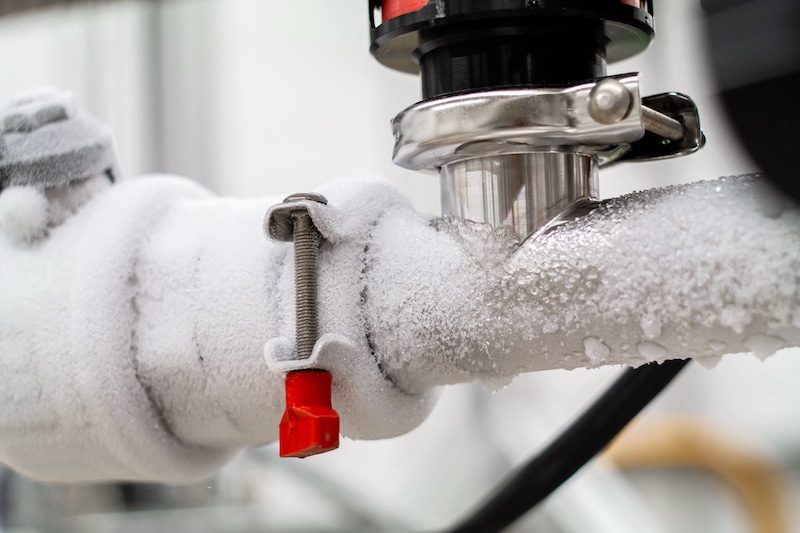Winter Plumbing—A Survival Guide

Believe it or not, spring is just over a month away here in Marmora. Just like you, the team at Broadley’s Plumbing, Heating & Air Conditioning looks forward to strolling along the boardwalk and soaking our feet in the Atlantic.
Until then, a steaming hot shower is still one of the best ways to warm your toes on a cold winter’s day. You also rely on warm water to kill viruses and bacteria that hide on your skin. If you have a boiler, it needs water to keep your home comfortable.
Any interruption in service could have a major impact on your day-to-day life. That’s why you should make sure your home water system runs smoothly in the winter.
To protect yourself and your family from common winter plumbing issues, here are a few pointers for success:
What You Should Know About Frozen Pipes
Subfreezing temperatures here in New Jersey can be cold and unforgiving, especially if your pipes are vulnerable. When a pipe freezes, it can burst and emit eight gallons of water or more per minute. Often before you even notice the leak, it can create thousands of dollars in damage to your floors, walls, ceilings, home appliances, and electronics.
How to protect your pipes from freezing:
You can take several safety measures to shield your pipes from freezing. Insulate your water heater tank and any exposed pipes. The American Red Cross recommends setting your thermostat no lower than 55 degrees when you leave home.
If you’re going to be away for an extended period, it may be worthwhile to drain your water system by turning off the supply valve and letting all your taps run dry.
How to recognize a frozen pipe:
Even if you’ve done your best to safeguard your water lines, they can still freeze. Burst pipes will create dark, wet patches on your ceiling or walls. Water may stop coming out of your tap, or slow down to a trickle. You can check exposed pipes for signs of frost.
How to deal with a frozen pipe:
Your water line froze—now what? First, try turning on a faucet. You can potentially melt the ice by letting the water run. If you’re able to identify the frozen spot, you can apply heat to it. We recommend wrapping it with a hot towel. You can also try a space heater, blow dryer, or hot pad. Never use an open flame, and don’t attempt to thaw a pipe located near any electrical equipment.
What to do in the event of a pipe burst:
Always take the time to learn where the water supply switch is located in your home. If there ever is a pipe burst, act fast and switch off your water supply immediately. Next, call Broadley’s Plumbing, Heating & Air Conditioning for immediate emergency plumbing assistance. Remove all valuables far away from the source of the flooding. Be sure to keep a record of the damage before calling your insurance provider.
What You Should Know About Your Boiler
Boilers circulate radiant heat produced by boiling water. Just like any other piece of machinery that gets heavy use, boilers require routine maintenance. Here are two things you should be doing to ensure your boiler runs smoothly:
Check your anode rod.
The anode rod protects the interior of your boiler from corrosion. Because it is made from weak metals (usually zinc, aluminum, or magnesium), the corrosion will attack it first. The anode rod needs to be replaced every four to six years, or when it begins to rust. It’s certainly not the type of thing you need to check obsessively, but it’s a good idea to take a peek at it once per season.
Bleed your boiler.
During the off-seasons, radiators collect air bubbles. These pockets of air prevent it from heating to the proper temperature. To fix this, you should “bleed” your radiators, which is a fancy way of saying, “releasing the air bubbles.” Don’t be intimidated—it’s a simple process.
Get a screwdriver or socket wrench, and a bucket for water spills. Next, crank on the heat while allowing your boiler to fill with fresh water. Locate the vent valve, a spigot-like piece near the top of the radiator. Loosen the valve using your tool, and hold the bucket underneath to catch any excess water spillage. After all the air has escaped, refasten the valve.
Learn More About Plumbing Maintenance
Need your home plumbing optimized for the winter? Broadley’s Plumbing, Heating & Air Conditioning offers winterization services to prepare your home for the coldest of winter days. We will inspect all of your plumbing fixtures leaks, turn off unnecessary water lines. We’ll also bleed your pipes and water heater, optimizing water flow and reducing the risk of bursts.
If you need plumbing assistance, call our Marmora, NJ office today at 609-390-3907 or request service online today.
